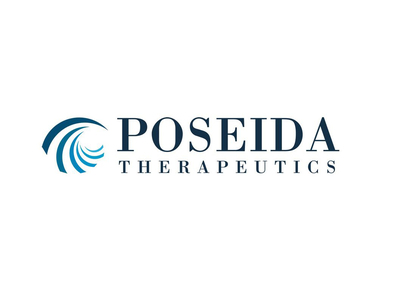Poseida Therapeutics to Present New Preclinical Data Supporting Non-Viral Gene Editing with P-KLKB1-101 for the Treatment of Hereditary Angioedema
Poseida Therapeutics (PSTX) announced new preclinical data for P-KLKB1-101, a liver-directed gene editing therapy for hereditary angioedema (HAE). The data demonstrated high-fidelity KLKB1 gene editing with off-target edits below 0.1%. In a humanized mouse model, a single dose achieved 58% reduction in kallikrein levels at 0.125 mg/kg, with effects lasting at least 180 days. Non-human primate studies showed favorable tolerability with liver editing approaching therapeutic range, and optimization yielded 29% increased potency. The company's proprietary lipid nanoparticle delivery system enabled controlled dose response.
Poseida Therapeutics (PSTX) ha annunciato nuovi dati preclinici per P-KLKB1-101, una terapia di editing genetico diretta al fegato per l'angioedema ereditario (HAE). I dati hanno dimostrato un editing del gene KLKB1 ad alta fedeltà con modifiche off-target inferiori allo 0,1%. In un modello murino umanizzato, una singola dose ha raggiunto una riduzione del 58% nei livelli di kallikrein a 0,125 mg/kg, con effetti che durano almeno 180 giorni. Gli studi su primati non umani hanno mostrato una tollerabilità favorevole con editing epatico che si avvicina al range terapeutico e l'ottimizzazione ha portato a un aumento del 29% della potenza. Il sistema proprietario di consegna di nanoparticelle lipidiche dell'azienda ha reso possibile una risposta dose-controllata.
Poseida Therapeutics (PSTX) anunció nuevos datos preclínicos para P-KLKB1-101, una terapia de edición genética dirigida al hígado para el angioedema hereditario (HAE). Los datos demostraron una edición genética de KLKB1 de alta fidelidad con ediciones fuera del objetivo por debajo del 0.1%. En un modelo de ratón humanizado, una sola dosis logró una reducción del 58% en los niveles de calicreína a 0.125 mg/kg, con efectos que duraron al menos 180 días. Los estudios en primates no humanos mostraron una tolerabilidad favorable con la edición hepática acercándose al rango terapéutico, y la optimización dio como resultado un aumento del 29% en la potencia. El sistema de entrega de nanopartículas lipídicas patentado de la empresa permitió una respuesta de dosis controlada.
포세이다 테라퓨틱스 (PSTX)는 유전성 혈관부종 (HAE)을 위한 간 선택형 유전자 편집 치료제인 P-KLKB1-101의 새로운 전임상 데이터를 발표했습니다. 데이터는 표적 이외의 교정이 0.1% 미만인 고충실도 KLKB1 유전자 편집을 보여주었습니다. 인간화된 쥐 모델에서 단일 용량은 0.125 mg/kg에서 칼리크레인 수치를 58% 감소시켰으며, 효과는 최소 180일 이상 지속되었습니다. 비인간 영장류 연구에서는 간 편집이 치료 범위에 가까운 호의적인 내약성을 보였으며, 최적화로 29%의 효능 증가가 이루어졌습니다. 회사의 독자적인 지질 나노입자 전달 시스템은 제어된 용량 반응을 가능하게 했습니다.
Poseida Therapeutics (PSTX) a annoncé de nouvelles données précliniques pour P-KLKB1-101, une thérapie d'édition génétique dirigée vers le foie pour l'angioedème héréditaire (HAE). Les données ont montré un édition du gène KLKB1 avec une grande précision, les modifications hors cible étant inférieures à 0,1 %. Dans un modèle de souris humanisé, une seule dose a permis de réduire de 58 % les niveaux de kallicréine à 0,125 mg/kg, avec des effets ayant duré au moins 180 jours. Des études sur des primates non humains ont montré une tolérance favorable avec un editing hépatique s'approchant de la fourchette thérapeutique, et l'optimisation a entraîné une augmentation de 29 % de la puissance. Le système de livraison de nanoparticules lipidiques propriétaire de la société a permis une réponse dosée contrôlée.
Poseida Therapeutics (PSTX) hat neue präklinische Daten für P-KLKB1-101, eine leberspezifische Genbearbeitungstherapie für hereditäres Angioödem (HAE), bekannt gegeben. Die Daten zeigten eine hochpräzise KLKB1-Genbearbeitung mit Off-Target-Änderungen unter 0,1%. In einem humanisierten Mausmodell erzielte eine einzige Dosis eine Reduktion der Kallikreinwerte um 58% bei 0,125 mg/kg, mit Wirkungen, die mindestens 180 Tage anhielten. Studien an Nichtmenschlichen Primaten zeigten eine günstige Verträglichkeit mit einer Leberbearbeitung, die den therapeutischen Bereich erreichte, und durch Optimierung wurde die Potenz um 29% gesteigert. Das firmeneigene Lipid-Nanopartikel-Transportsystem ermöglichte eine kontrollierte Dosisantwort.
- Achieved 58% reduction in kallikrein levels at low dose (0.125 mg/kg)
- Treatment effects lasted at least 180 days in mouse model
- Off-target edits consistently below 0.1%, indicating high specificity
- 29% increase in potency through optimization
- Favorable tolerability in non-human primate studies
- Still in preclinical stage, requiring significant development before human trials
- Therapeutic effectiveness only demonstrated in animal models
Insights
The preclinical data for P-KLKB1-101 shows promising potential in treating Hereditary Angioedema (HAE). Key findings demonstrate 58% reduction in kallikrein levels at a low dose of
The improved lipid nanoparticle delivery system shows a
For investors, this represents significant progress in Poseida's gene editing platform, particularly for rare diseases. The HAE market, while niche, has substantial revenue potential due to high treatment costs and lifelong therapy requirements.
The Cas-CLOVER gene editing system demonstrates technical advantages over existing approaches. The combination of high specificity, controlled dose response and efficient delivery through proprietary lipid nanoparticle technology creates a robust platform with broader applications beyond HAE treatment.
The achievement of therapeutic editing at low doses (
The non-viral delivery system addresses key challenges in gene therapy, potentially offering better scalability and reduced manufacturing complexity compared to viral vectors. This technical foundation could position Poseida favorably in the competitive gene editing landscape.
Data to be highlighted in a Distinguished Industry Oral Abstract presentation at the American College of Allergy, Asthma & Immunology (ACAAI) 2024 Scientific Meeting
"The newest preclinical data for P-KLKB1-101 support our goal to develop a gene editing treatment option for HAE with encouraging early tolerability, safety and efficacy results," said Blair Madison, Ph.D., Chief Scientific Officer, Gene Therapy at Poseida Therapeutics. "We achieved a highly effective, therapeutically relevant reduction of kallikrein in our new humanized pre-clinical mouse model at a low 0.125 mg/kg dose, marking an improvement in our lipid nanoparticle delivery efficiency. These tools could potentially enable therapeutic gene editing in other liver-relevant targets, considering the high fidelity editing of Cas-CLOVER and the promising delivery efficiency we are seeing with our proprietary lipid and LNP in pre-clinical studies."
HAE is a rare inherited disorder characterized by recurrent episodes of fluid accumulation outside of blood vessels, causing rapid swelling of tissues. The swelling is caused by unchecked activation of the kallikrein-bradykinin cascade due to deficiency of the C1 esterase inhibitor, a protein that is involved in regulating vascular permeability and the contact system. Patients with HAE are in need of a durable, effective, and convenient treatment option that eliminates recurrent attacks.
P-KLKB1-101 is a fully non-viral investigational gene editing therapy designed to enable high fidelity editing at the pre-kallikrein gene, or KLKB1, for correction of HAE. It utilizes the Cas-CLOVER nuclease, which is engineered for high specificity, to achieve site-specific gene editing.
Key Highlights from P-KLKB1-101 Data to be Presented at ACAAI
- P-KLKB1-101 enabled highly efficient KLKB1 editing and reduction of kallikrein in cultured primary human hepatocytes, with all off-target edits consistently at or below
0.1% , including at high dose levels. - P-KLKB1-101 yielded controlled, dose-dependent reductions in kallikrein protein levels and activity in a new humanized mouse model. The reduction in plasma kallikrein levels was stable and persisted for at least 180 days (latest time point assessed). In this model, the targeted therapeutic level of KLKB1 editing was achieved with a single dose, and a
58% reduction of kallikrein levels at the minimally effective dose of 0.125 mg/kg. - Interim non-human primate (NHP) data demonstrate that P-KLKB1-101 had favorable tolerability and achieved liver editing approaching the desired therapeutic range. Ongoing lead optimization of P-KLKB1-101 yielded a
29% increase in potency (as measured by on-target KLKB1 editing) relative to a historical dose-matched benchmark. - Poseida's novel ionizable lipid and lipid nanoparticle (LNP) enables potent in vivo delivery of P-KLKB1-101 and a controlled dose response.
Presentation Details
The data will be presented on Saturday, October 26 by Dr. Madison at the American College of Allergy, Asthma & Immunology (ACAAI) 2024 Scientific Meeting in
Title: Highly Specific Non-Viral Gene Editing with P-KLKB1-101 for Hereditary Angioedema
Abstract #: 8063
Session: Distinguished Industry & Late-breaking Oral Abstracts – Session 1
Session Date/Time: Saturday, October 26, 4:30-6:00 p.m. ET (presentation at 5:03 p.m. ET)
About P-KLKB1-101
P-KLKB1-101 is an investigational liver-directed non-viral gene editing approach designed using the Cas-CLOVER™ Site-Specific Gene Editing System, Poseida's proprietary high-fidelity nuclease. P-KLKB1-101 is designed for site-specific gene editing of the KLKB1 gene for the treatment of hereditary angioedema (HAE). This rare inherited disorder results in the swelling of the skin, intestinal tract, and airways, which can be both debilitating and life-threatening. Preclinical data demonstrates therapeutically relevant reduction of pre-kallikrein levels in both mouse and non-human primate models.
About Cas-CLOVER
The Cas-CLOVER™ Site-Specific Gene Editing System employs dual RNA-guided DNA targeting for high fidelity editing. The dual guide RNA targeting provides spatial restrictions on each of two Cas-CLOVER molecules after interacting with specific DNA sequences. This interaction then allows Clo051 cutting at the target site. The result is a highly specific edit by the Cas-CLOVER nuclease, and a low incidence of unwanted off-target edits, with 25-fold greater fidelity than CRISPR/Cas9.
About Poseida Therapeutics, Inc.
Poseida Therapeutics is a clinical-stage biopharmaceutical company advancing differentiated allogeneic cell therapies and genetic medicines with the capacity to cure. The Company's pipeline includes investigational allogeneic CAR-T cell therapies for hematologic cancers, autoimmune diseases, and solid tumors, as well as investigational in vivo genetic medicines that address patient populations with high unmet medical need. The Company's approach is based on its proprietary genetic editing platforms, including its non-viral transposon-based DNA delivery system, Cas-CLOVER™ Site-Specific Gene Editing System, Booster Molecule and nanoparticle gene delivery technologies, as well as in-house GMP cell therapy manufacturing. The Company has formed strategic collaborations with Roche and Astellas to unlock the promise of cell therapies for cancer patients. Learn more at www.poseida.com and connect with Poseida on X and LinkedIn.
Forward-Looking Statements
Statements contained in this press release regarding matters that are not historical facts are "forward-looking statements" within the meaning of the Private Securities Litigation Reform Act of 1995. Such forward-looking statements include statements regarding, among other things, the potential capabilities and benefits of the Company's technology platforms and product candidates, including P-KLKB1-101; the quote from Dr. Madison; and the Company's plans and strategy with respect to developing its technologies and product candidates. Because such statements are subject to risks and uncertainties, actual results may differ materially from those expressed or implied by such forward-looking statements. These forward-looking statements are based upon the Company's current expectations and involve assumptions that may never materialize or may prove to be incorrect. Actual results could differ materially from those anticipated in such forward-looking statements as a result of various risks and uncertainties, which include, without limitation, the fact that interim data from the Company's preclinical trials may change as more data become available; the Company's reliance on third parties for various aspects of its business; risks and uncertainties associated with development and regulatory approval of novel product candidates in the biopharmaceutical industry; the Company's ability to retain key scientific or management personnel; whether any of the Company's product candidates will be shown to be effective, safe and reliable; and the other risks and uncertainties described in the Risk Factors section of Poseida's Quarterly Report on Form 10-Q filed with the Securities and Exchange Commission (SEC) on August 5, 2024, and in other filings Poseida makes with the SEC from time to time. All forward-looking statements contained in this press release speak only as of the date on which they were made. The Company undertakes no obligation to update such statements to reflect events that occur or circumstances that exist after the date on which they were made, except as required by law.
![]() View original content to download multimedia:https://www.prnewswire.com/news-releases/poseida-therapeutics-to-present-new-preclinical-data-supporting-non-viral-gene-editing-with-p-klkb1-101-for-the-treatment-of-hereditary-angioedema-302285382.html
View original content to download multimedia:https://www.prnewswire.com/news-releases/poseida-therapeutics-to-present-new-preclinical-data-supporting-non-viral-gene-editing-with-p-klkb1-101-for-the-treatment-of-hereditary-angioedema-302285382.html
SOURCE Poseida Therapeutics, Inc.








